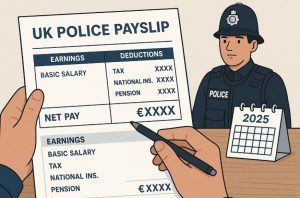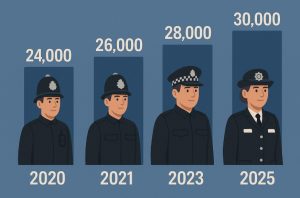Understanding the updated police pay scales for 2025 is essential for anyone considering a career in UK law enforcement or currently serving. With a 4.75% uplift applied across all ranks for the 2024–2025 period, the salary structure reflects efforts to align officer compensation with economic conditions and responsibilities.
This guide breaks down the latest figures for constables, sergeants, and inspectors, including regional variations and progression details, helping officers and recruits plan their careers with clarity and confidence.
What Are the New Police Pay Scales in 2025?

The police pay scales for the year 2024-2025 have been updated following recommendations by the Police Remuneration Review Body.
Officers at all ranks are receiving a 4.75% salary uplift in response to inflation and to maintain parity with the evolving cost of living in the UK. This pay adjustment applies to all active officers and new recruits starting from 1 September 2024.
The review aims to ensure that officers are adequately compensated for the responsibilities and risks associated with the role. This pay rise supports long-term recruitment, retention and overall morale within the force.
How Much Does a Police Constable Earn in the UK in 2025?
A police constable’s salary is determined by their entry date into the force and their progression through designated pay points. Officers appointed before and after 1 April 2013 follow slightly different structures.
Constables Appointed Before 1 April 2013
| Pay Point | 2023 Pay | 2024-2025 Pay | % Uplift |
| On commencing service | £30,069 | £31,497 | 4.75% |
| After initial training | £33,324 | £34,908 | 4.75% |
| 2 | £35,133 | £36,801 | 4.75% |
| 3 | £37,158 | £38,922 | 4.75% |
| 4 | £38,265 | £40,083 | 4.75% |
| 5 | £39,432 | £41,304 | 4.75% |
| 6 | £42,720 | £44,748 | 4.75% |
| 7 | £46,044 | £48,231 | 4.75% |
Constables Appointed On or After 1 April 2013
| Pay Point | 2023 Pay | 2024-2025 Pay | % Uplift |
| 1 | £28,551 | £29,907 | 4.75% |
| 2 | £29,751 | £31,164 | 4.75% |
| 3 | £30,957 | £32,427 | 4.75% |
| 4 | £32,163 | £33,690 | 4.75% |
| 5 | £34,575 | £36,216 | 4.75% |
| 6 | £39,432 | £41,304 | 4.75% |
| 7 | £46,044 | £48,231 | 4.75% |
These figures highlight steady and structured growth for police constables, with clear benchmarks in place for officers at every stage of their career.
What Is the 2025 Salary for Police Sergeants in the UK?

Sergeants serve as the first line of command and their earnings reflect their leadership responsibilities. The 2024-2025 pay uplift impacts all sergeant ranks across forces in the UK.
| Pay Point | 2023 Pay | 2024-2025 Pay | % Uplift |
| 2 | £49,077 | £51,408 | 4.75% |
| 3 | £50,079 | £52,458 | 4.75% |
| 4 | £51,498 | £53,943 | 4.75% |
The promotion to sergeant brings with it increased expectations, and the compensation structure reflects the added responsibility in overseeing constables, managing shift performance and maintaining operational standards.
How Much Do Police Inspectors Earn in 2025?
Inspectors are vital to strategic decision-making and resource allocation within each policing unit. Salaries for this rank differ depending on whether the officer is stationed inside or outside of London.
Inspectors Outside London
| Pay Point | 2023 Pay | 2024-2025 Pay |
| 0 | £58,422 | £61,197 |
| 1 | £60,015 | £62,865 |
| 2 | £61,602 | £64,527 |
| 3 | £63,198 | £66,201 |
Inspectors in London
| Pay Point | 2023 Pay | 2024-2025 Pay |
| 0 | £60,891 | £63,783 |
| 1 | £62,487 | £65,454 |
| 2 | £64,089 | £67,134 |
| 3 | £65,688 | £68,808 |
London-based inspectors receive a higher salary due to regional allowances that account for the city’s higher living costs and increased demand.
What Are the Salary Differences Between Police Ranks in 2025?

The salary structure in UK policing is designed to reflect the increased responsibility, leadership, and experience required as officers rise through the ranks. Each role carries a clearly defined pay scale, ensuring consistency and transparency across the profession.
Constables: The Frontline Workforce
Police constables represent the majority of the workforce and handle general policing duties such as patrol, response to incidents, public engagement, and preliminary investigations. The constable salary progresses through several pay points based on time served and satisfactory performance.
- Entry-level constables earn between £29,907 and £31,497 depending on their appointment date
- After approximately seven years, constables can reach a top salary of £48,231
- Additional allowances may be provided for shift work, location, or specialist units
Sergeants: First-Line Supervisors
Sergeants are responsible for supervising teams of constables, overseeing operations, and maintaining discipline within their unit. This position marks the first step into formal leadership within the force.
- Salaries range from £51,408 to £53,943 in 2024-2025
- Progression is based on time in rank and performance
- Opportunities for overtime and team allowances can supplement pay
Inspectors: Operational Leaders
Inspectors manage resources, allocate duties, and oversee investigations at a strategic level. Their decisions influence operational success across entire policing units.
- Outside London, inspectors earn between £61,197 and £66,201
- In London, the range rises from £63,783 to £68,808 due to regional weighting
- Inspectors typically have over a decade of experience and significant managerial responsibilities
Chief Inspectors and Above
Although not covered in detail in this article, it’s worth noting that chief inspectors and senior ranks such as superintendents and chief officers earn significantly more, with salaries increasing well above £70,000 and into six-figure ranges at the highest levels.
Rank-Based Salary Comparison
This comparative snapshot provides a quick reference to how salaries scale by rank:
| Rank | Approximate Top Salary (2024-2025) |
| Constable | £48,231 |
| Sergeant | £53,943 |
| Inspector (Outside London) | £66,201 |
| Inspector (London) | £68,808 |
| Chief Inspector (Outside London) | £70,200+ |
| Chief Inspector (London) | £72,798+ |
Each step up the ladder not only increases earnings but brings with it a broader scope of responsibility and leadership expectations.
Are There Any Additional Earnings Like Overtime and Bonuses?

Police officers often have the opportunity to earn more than their base pay through additional roles and unsocial working hours. These earnings include:
- Overtime for hours worked beyond a standard shift
- Enhanced pay for night shifts, bank holidays, and weekends
- London Weighting allowance for officers based in the capital
- Specialist role allowances (e.g. dog handler, firearms, counter-terrorism)
These supplementary earnings vary depending on the force, the assignment, and the officer’s role. While not guaranteed, they can provide a meaningful increase to annual income.
What About Police Pension and Benefits in 2025?
Pensions and employee benefits are key incentives in public service careers, and UK policing continues to offer one of the most comprehensive packages in the public sector. These benefits contribute significantly to long-term financial security and job satisfaction.
Police Pension Scheme 2015
Most serving officers are enrolled in the Police Pension Scheme 2015, a career average revalued earnings (CARE) scheme. It is designed to provide a stable and predictable income after retirement based on service length and average salary over time.
- Officers contribute a percentage of their salary monthly
- The scheme is backed by employer contributions, often exceeding 20%
- Benefits increase annually in line with inflation
- Officers can begin receiving their full pension at their state pension age, with provisions for early retirement
Early Retirement and Transfer Options
The pension scheme offers flexibility for officers who leave the service early or transition to another public sector role.
- Officers can transfer accrued pension rights between public pension schemes
- Deferred benefits are preserved and adjusted for inflation
- Partial retirement and phased drawdowns are available under certain conditions
Additional Employee Benefits
In addition to pensions, police officers receive a wide range of benefits that support their wellbeing and enhance their quality of life throughout their career.
Health and Wellbeing Support
- Access to occupational health services
- Confidential counselling and mental health support
- Physical fitness incentives and free or subsidised gym memberships
Leave Entitlements
- Annual leave starting at 22 days and increasing with service
- Paid public holidays
- Special leave for personal emergencies or family needs
Workplace Perks and Discounts
- Travel and accommodation discounts through the Blue Light Card scheme
- Reduced rates on insurance, shopping, and dining
- Cycle to work schemes and other salary sacrifice initiatives
Long-Term Financial Security
One of the most attractive features of a policing career is the long-term financial assurance it offers. Between steady salary progression, structured retirement planning, and inclusive health and wellbeing support, officers are well-positioned to maintain stability beyond active duty.
These benefits collectively make UK policing not just a public service calling, but a professionally and financially rewarding career.
How Does the 2025 UK Police Pay Compare with Previous Years?

A review of police pay progression over the last five years shows modest but consistent increases, largely driven by public sector review and inflation.
| Year | Constable Starting Salary |
| 2020 | £26,000 (approx.) |
| 2021 | £27,500 (approx.) |
| 2022 | £28,500 |
| 2023 | £30,069 |
| 2024-2025 | £31,497 |
This trend reflects a growing awareness of the financial pressures facing officers, especially in urban environments.
What Are the Regional Variations in Police Salaries Across the UK?
While the base pay is relatively standardised across the UK, some forces offer additional allowances based on regional considerations. Officers working in London, for example, receive a higher salary through a specific London Allowance.
Differences also exist in Scotland, Wales, and Northern Ireland due to devolved administration and local agreements.
Regional salary considerations include:
- Cost of living adjustments for metropolitan areas
- Rural force differences in overtime availability
- Allowances for housing or transport in remote areas
Understanding these variations is essential for officers considering relocation or applying to different constabularies.
What Can You Expect as a New Police Recruit in 2025?
New police recruits joining in 2025 can expect a well-supported entry into the profession. Most will start on a salary between £29,907 and £31,497, depending on entry route and force.
Key aspects of the initial experience include:
- A structured probation period with formal assessments
- Access to a national training programme and mentorship
- Potential for salary increases during the first 12 months based on training completion
- Full eligibility for pension and employee benefits from day one
Career development for new recruits is often rapid, with many progressing to specialist roles or supervisory positions within the first few years.
Conclusion
With structured pay progression, annual reviews, and strong pension benefits, policing in the UK remains a financially viable and secure career.
While starting salaries may not rival some private sector jobs, the long-term rewards — including public service fulfilment — continue to attract thousands each year.
FAQs About Police Pay Scales 2025 in the UK
What is the starting salary for police apprentices in 2025?
Apprentice officers can start around £23,000 to £26,000, depending on the force, with full constable salary granted post-probation.
Do police officers get paid weekly or monthly?
Most police officers in the UK are paid monthly, typically on the last working day of the month.
How long does it take to reach top constable pay?
It generally takes 7 years of service to reach the top of the constable pay scale, assuming standard performance progression.
Is overtime guaranteed for UK police officers?
Overtime is not guaranteed and is subject to operational need. However, it is common during emergencies or major events.
Can part-time officers access the same pay scale?
Yes, part-time officers are paid on a pro-rata basis according to the same pay scales as full-time officers.
Do officers receive additional pay for hazardous duties?
Specialist roles like firearms or counter-terrorism units may attract additional allowances, depending on the force policy.
Are police salaries subject to income tax and national insurance?
Yes, all police salaries are subject to standard deductions including income tax, national insurance, and pension contributions.








